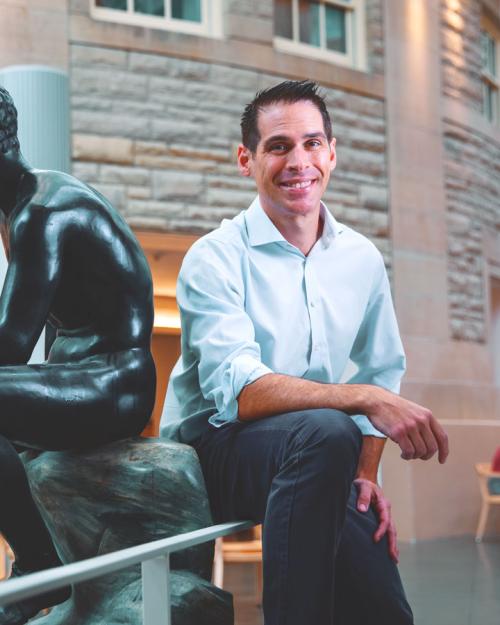How do people not only set goals for themselves, but also achieve them? Does the use of cellphones and social media help or hurt the quality of life of people in relationships? And how, why and when does diversity affect the performance of firms in the business world?
These are a few of the questions Cornell social sciences faculty are answering this spring, thanks to funding awarded by the Institute for the Social Sciences. The ISS’s Spring 2019 Small Grant Awards are designed to assist scholars as they develop new research and seek external funding.
A total of 12 small grants were awarded to social science researchers representing six colleges and schools at Cornell.
In the College of Arts and Sciences’ Department of Government and Latino Studies Program, assistant professor Sergio Garcia-Rios will ask whether anti-Mexican xenophobic rhetoric from the 2016 presidential campaign affects Latinos’ attitudes toward policies directly related to Latinos. He hypothesizes that Latinos of non-Mexican heritage distance themselves from Latinos of Mexican heritage by not supporting these policies.
Also in Arts and Sciences, Abigail Cohn, professor of linguistics, and Gregory Green, curator of the Echols Collection on Southeast Asia, will use their grant to support Laotian graduate students’ social science research, which the students will present at the Sixth International Conference on Lao Studies, June 13-15 at Cornell. The grant will also subsidize a special issue of the Journal of Lao Studies from the conference proceedings.
Researchers in the College of Human Ecology won three awards. Adam Anderson, associate professor of human development, and Geoffrey Fisher, assistant professor of applied economics in the College of Agriculture and Life Sciences, will investigate how attention affects people’s willingness to initiate effort and persevere toward a goal. They’ll also identify the neural mechanisms involved.
Zhuan Pei, assistant professor of policy analysis and management, and Christina Korting, a doctoral candidate, will study a quasi-experimental strategy known as regression discontinuity design. More and more social scientists are using this strategy to assess the impacts of policies, in large part because of the ways it enables data to be shown graphically. But not much is known about how readers perceive those visual representations. The researchers will look into that question and establish guidelines for practitioners.
Ten years ago, Sharon Sassler, professor of policy analysis and management, interviewed unmarried couples who were living together to understand how their socio-economic backgrounds affected various aspects of their relationships. Now she will interview them again, to see how class and gender intersect with ways in which these couples have or have not decided to get married.
Scholars in the College of Agriculture and Life Sciences also won three grants. In the Department of Communication, associate professor Natalie Bazarova and doctoral candidate Samuel Taylor will try to understand how the expectation of always being available via mobile phones affects a person’s quality of life when they are in a relationship. Does it offer a sense of security, or a sense of stress due to being permanently expected to provide support to friends and family?
Wendy Wolford, vice provost for international affairs and professor of development sociology, and postdoctoral researcher Andrew Ofstehage will organize a workshop – including a public lecture, feedback on individual papers and a timeline for an upcoming edited volume – focusing on the political, historical, social and biological processes related to land.
Brian Dillon, assistant professor of applied economics, will investigate the bottlenecks that prevent owners of micro-businesses in developing countries from expanding their operations. With his grant, he’ll study whether mobile phones and a digital “phone book” of potential contacts and customers will expand the networks of small business owners in Tanzania.
In the Cornell SC Johnson College of Business, Jamie Perry, assistant professor of management and organizations, and Chekitan S. Dev, professor of marketing and management communication, will examine how, why and when diversity impacts firm performance. Despite decades of research on diversity in organizations, very little is known about the mechanisms that strengthen or weaken the link between diversity and a firm’s performance.
Also at SC Johnson, Kaitlin Woolley, assistant professor of marketing, will study the growing phenomenon of companies offering financial incentives to encourage people to post reviews online. She’ll look at whether immediate incentives influence the degree to which reviewers use language that conveys positive emotion.
In the School of Industrial and Labor Relations, Marya Besharov, associate professor of organizational behavior, will look at how “food hubs” – which aggregate, market and distribute locally grown food – create social change by making it easier for small growers to survive and by giving low-income consumers access to fresh produce.
Ricardo Daziano, associate professor of civil and environmental engineering in the College of Engineering, and So-Yeon Yoon, associate professor of design and environmental analysis in the College of Human Ecology, will investigate whether being in a crowded restaurant or subway changes a person’s perception of time and how they make decisions.
This story originally appeared in the Cornell Chronicle.




